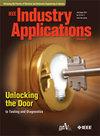Cooperative State-of-Charge Balancing of Supercapacitors: A Switched Systems Approach
IF 4.2
2区 工程技术
Q2 ENGINEERING, ELECTRICAL & ELECTRONIC
引用次数: 0
Abstract
State-of-charge (SoC) estimation and cell balancing are typically considered as two separate problems in the supercapacitor management systems. However, the SoC estimation accuracy decreases significantly when the cell balancing circuit is activated, which will further degrade the cell balancing performance. In this paper, we propose a switched systems approach to address this issue by integrating the two problems together in a unified switched systems framework. The proposed method consists of two stages: balancing-aware SoC estimation and observer-driven cell balancing. In the first stage, we propose a switching sliding mode observer to estimate the SoC of supercapacitor balancing systems, where two observers are designed for supercapacitors with cell balancing activated or deactivated. In the second stage, a cooperative SoC balancing method is proposed to synchronize the SoC of supercapacitors, which can effectively improve the energy efficiency during the charging process. An experimental platform is established, and the SoC estimation performance and SoC balancing performance are verified with experiment results. Experiment results indicate that the switching sliding mode observer improves the SoC accuracy by 4.96% than its non-switching counterpart and the cooperative balancing method improves the energy efficiency by 8.7% compared with the decentralized balancing method.求助全文
约1分钟内获得全文
求助全文
来源期刊

IEEE Transactions on Industry Applications
工程技术-工程:电子与电气
CiteScore
9.90
自引率
9.10%
发文量
747
审稿时长
3.3 months
期刊介绍:
The scope of the IEEE Transactions on Industry Applications includes all scope items of the IEEE Industry Applications Society, that is, the advancement of the theory and practice of electrical and electronic engineering in the development, design, manufacture, and application of electrical systems, apparatus, devices, and controls to the processes and equipment of industry and commerce; the promotion of safe, reliable, and economic installations; industry leadership in energy conservation and environmental, health, and safety issues; the creation of voluntary engineering standards and recommended practices; and the professional development of its membership.
 求助内容:
求助内容: 应助结果提醒方式:
应助结果提醒方式:


